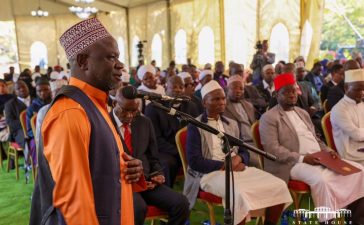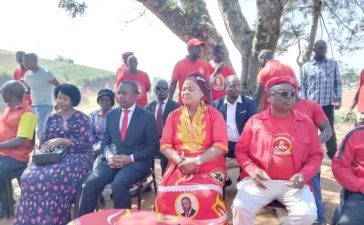“Trip to Canaan” metaphorically implies Malawi migrating from the regime and era of a country’s crisis that was inflicted by the previous (DPP) administration. The metaphor is drawn from a Biblical story of Israelites fleeing from a bondage in Egypt into Canaan – their promised peaceful land of provisions and joy. The anatomy of that crisis has body parts like wanton plunder of public money with total impunity; acceleration of lawlessness in which party cadres could openly threaten and perpetuate harmful assaults on people – yet with impunity; state capture by a tribal cabal which dominated every sector of the government in the name of “establishing a system”; scot-free murders of persons living with albinism; diversion and looting of public money meant for public hospitals and central medical stores; reservation and illegal awarding of all public contracts to the tribal cabal; and open and defiant theft of institutions like MSB from the State ownership to their tribal cabal through Mulli, among others.
Similar to the Biblical King Pharaoh of Egypt, who resisted the Israelites fleeing from Egypt, the Malawian King of the cabal then resisted Malawi’s exodus to the promised land through attempted vote rigging and attempted denial of fresh elections. Reflective of the attempted resistance by Pharaoh, the King of Malawi failed to succeed in his resistance and Malawians embarked on their journey accordingly. Fast forward into the journey, is it taking a good and promising course?
To begin with, Malawi’s trip to the promised land began on a terrible note of natural and made-made disasters. The natural disaster being the Covid-19 pandemic while the man-made disaster being the foolish decision that betrayed forex reserves; looting of billions from the Reserves Bank by the previous administrators before leaving the power baton to the new administration; and the K4.1 trillion debt among others.
The Covid-19 Impact
Malawi registered the first confirmed case of Covid 19 on the eve of 2020 first quarter. While governments world over enacted restrictions to curtail the virus, it continued to spread at an alarming rate regardless. The closures of boarders and domestic curfews intended to contain the viral spread in several countries disrupted the supply chain industry, and tourism most significantly. As such, productivity declined leading to low business activities. The World Bank touts that the economic damage thus far represents the largest economic shock the world has experienced in decades. Despite governments’ efforts to cushion the pandemic’s repercussions through fiscal and monetary support policies, emerging and developing economies in 2020 plunged into recession at least contracting the economies by 2.5%.
Along these downturns, Tonse Alliance assumed administration of the Republic of Malawi at which juncture virality of the virus advanced. Six Month later as of January 2021, the cases worsened further surmounting pressure in dwindling economic growth. It should therefore be easily understood why inflation towards the end of 2020 and early 2021 accelerated, and as high as to 9.4% as of May 2021.
As agricultural commodity markets opened, Malawi registered positive economic gains decelerating inflation to the current 8.9%. The question is why then is there an increase in some food products prices?
Well, good question! Increase in prices is a factor of cost of production and supply. The reality is that in the case of Malawi there are some products that have increased in prices and others which have decreased. The difference is on the value chain of the product. For agricultural products such as Maize, prices have fallen due to surplus production which have increased market supply. On the other hand, cooking oil prices have hiked due to increase in prices for crude oil globally. Contrary to cartels in the oil industry who purports that re-introduction of 16.5% VAT by the Tonse government has exacerbated its price hike, the VAT should rather reduce the price of the commodity since by such the producers can claim input VAT.
Prospects by World Bank indicate that growth in low-income economies such as Malawi in this year is anticipated to be the slowest in the past 20 years other than 2020. How is it possible that the slowness in economic growth will be less in the period that we are hit by the pandemic? Do not get puzzled. Here is the sense: According to World Bank, this is the case for all low-income countries where Covid-19 impact has not been felt much on their export productivity. Though recoveries from recession are projected at 2.9% in 2021 and 4.7 % in 2022, output level for these economies in 2022 is projected to be 4.9% lower than pre-pandemic projections.
Betrayal of Malawi’s Forex
As it stands, the exchange rate for Malawi Kwacha against the dollar has depreciated since foreign exchange is in short supply which has affected prices of nonfood items since there is an increased demand for forex.
Revelations have it that the prevailing Forex shortage in the country is curtsey of an abrupt decision by former DPP administration to terminate currency sap deals with the African Export/Import Bank (AfreximBank).
The Reserve Bank of Malawi entered into a direct note purchase facility programme with AfriximBank worthy US$450 million. While the Reserve Bank of Malawi was giving AfreximBank this amount in local currency, AreximBank was giving the Reserve Bank of Malawi this amount in Foreign Currency. This resulted into Malawi registering some stability in its Forex due to accumulation of foreign exchange reserves from the swap deal. This swap deal was being rolled over annually. Because of this stability, the Reserve Bank of Malawi was able to intervene on the market and pay for key imports such as fertilizer and fuel import bills.
In June last year, it became so apparent that the DPP government was desired no more and all signs were that Malawi was doing away with DPP regime. Feeling assaulted through the series of street demonstrations; the consequential loss of the court case; and its failure to resist fresh elections, the DPP regime thought of punishing Malawi by terminating the forex swap deal with AfreximBank in June last year. Since AfreximBank had already committed US$450 to Malawi, the termination meant that the Reserve Bank of Malawi has to repay the amount to AfreximBank in foreign currency that was given. By converting to the five-year note programme that was agreed upon, it means the Reserve Bank has an obligation to pay back this US$450 million in tranches. Meanwhile, the Reserve Bank has already paid about K27 billion to AfreximBank in foreign currency between January and March this year hence creating significant outflow from the Forex reserves. According to documents that Shire Times has seen, Malawi has up to 2022 to repay AfreximBank K241 billion (about US310 million). That is the DPP government which bears no agenda of uplifting Malawi but to use and abuse it to for self-enrichment programmes. DPP isadzabwelelenso sure!
Midnight Looting from the Reserve Bank
There is something, not so good, about the DPP and midnight activities. While the DPP’s love for nocturnal activities is well detailed, it remains quite hard to appreciate why such a formal institution loves to operate this way. Remember in 2012 DPPs top ranking members held a midnight meeting specifically aimed at blocking the then Vice President, Joyce Banda, from ascending to the presidential throne? Well, it turns out that this wasn’t their last midnight enterprise. It has since transpired that the night before Chakwera was declared president, the DPP via one of its trusted mafioso perched at the Reserve Bank, Dalitso Kabambe, took a parting shot at our taxes. And it wasn’t a small amount either, a whopping K4.1 billion kwacha was transferred from RBM that night.
Curtsey of Delloite audit report, we know of this nefarious, clandestine and criminal enterprise that occurred during the night before State power was transferred from DPP to the new administration in June last year. The report chronicles a heart-tearing series of illicit and dubious transactions including looting of K4.1 billion which was illegally transferred from the Reserve Bank of Malawi to FDH during the night before transfer of power. According to the audit report, among the numerous other illicit and dubious transaction fashioned for looting of money from the Reserve Bank between January 1 2019 and June 30 2020 were the:
• K2.2 billion which was siphoned through dubious “building maintenance, rentals, school fees allowances, recall of diplomats” transactions.
• K4.1 billion which was siphoned to FDH Bank through dubious payment to the Pensions and Gratuity Account without an approved funding instruction from government.
• K6.5 billion which was siphoned to FDH Bank in December 2018 and December 2020, without any explanations.
• USD$769 million which was siphoned through FDH Bank without any transaction necessitating the transfer.
• K27 billion which was siphoned through illegally and irregularly paying top managers who were retiring, who in turn provided K7 billion to the then governing Democratic Progressive Party (DPP).
• K2.8 billion which was siphoned through paying various law firms without any supporting cause for the payment.
• Looting of K1 billion through dubious contract awarded to a company called Mitra.
• K9.7 billion which was siphoned in January 2020 through dubious purchase of overpriced materials for the Prisons Department worth US$18 million from the United Arab Emirates (UAE).
As you can see, DPP was determined to loot everything from the public coffers and there was its chance at the central bank it appears. The RBM was reduced to nothing more than a “village bank” for the ruling DPP and its conduit entities like FDH Bank, legal firms and other business entities like Mulli Brothers. Shame! DPP isadzabwelerenso inu.
The Total Public Debt (TPD) Stock inherited by the new administration
The DPP administration did not end at misusing and abruptly terminating the short-term Forex relief swap deal with AfreximBank. There was a further injury of K4.1 trillion debt inflicted on our economy by the DPP regime. According to Mid Year Public Debt Report for 2020/2021 financial year, the previous regime left a total public debt stock of K4.13 trillion in June last year. Out of domestic debt stock of K2.7 trillion, about 83% were \treasury Notes.
The inflation, the depreciation and increased prices for non-food items especially, are all the result of COVID-19 impact. Nonetheless, the new leadership has set up a spring board of economic growth through the introduction of policies aimed at recovering and growing the economy. In the 1 year of rule for Tonse government, the following are highly recommendable wins which if well adopted by the citizenry, the country will be catapulted to register high economic gains:
- THE AFORDABLE INPUT PROGRAM (AIP)
Unlike the previous program Farm Input Subsidy Program (FISP) that targeted 1 Million households with K35 billion Kwacha, the AIP program targeted 3.8 Million farming households with a total budget of MK140.2 Billion. This represents the highest number of beneficiaries and respective budget in the history of support rendered to small holder farmers in Malawi. The target actually surpassed the total number of smallholder households which is approximately 3.5 Million. This allowed farmers to buy fertilizers at a reduced price of MK4, 495 per 50Kg bag against the standard price of MK20,000. The results are apparent now that production estimates have been pegged at 4.4 Million Metric tones which according to Famine Early Warning System Network, it is 45 percent above the previous five-year average and 21% above the national requirement.
- ADJUSTMENT OF TAX FREE THRESHOLD
The tax-free threshold for Pay As You Earn (PAYE) has been increased from K45,000 to K100,000 per Month. This obviously has led to many low-income earners to have disposable income of approximately MK16, 500. With a background of many employees having smallholder farmers as dependents in Malawi, this implies that now the employed have the capacity to remit money to buy at least 3 bags of fertilizers which they could otherwise not have managed or stretch themselves to do. There is therefore a direct interlink between this policy, AIP and poverty alleviation.
- THE MSME ORDER
The MSME Order under the Public Procurement and Disposal of Public Assets Act, has restricted certain sectors for micro, medium and small enterprises to supply products and services. Usually, big corporations play monopoly in such procurement deals as most startups are disadvantaged in terms of capacity to compete with them. This policy will allow many struggling small businesses to develop and new entrance to be encouraged to do business. Since this policy preliminary requirements are at the most generic level requiring MSME’s to be duly registered with business and tax authorities, and comply accordingly, it is a win-win situation between the entrepreneur and the government. The entrepreneur will get business from the government and eventually remit taxes to the government without which they cannot get business. This means business operations will be improved as small businesses will have capital to invest and government revenue basket will increase.
- FREE IMPORTATION OF RAW MATERIALS
Related to the increase of loans available for businesses through NEEF is the government’s removal of taxes pegged on raw materials for value addition. This reveals government’s efforts to promote manufacturing and industrialization as entrepreneurs will incur lower cost of production through these importations.
- OPERATIONALIZATION OF ACCESS TO INFORMATION BILL
After a daunting fight spanning for about 17 years by different key local and international stakeholder to have this bill passed, it only took a few months for the Chakwera administration to operationalize the bill by 30 September 2020. The enactment of the Access to Information law underpins the need to realize the constitutional principles on right to information and good governance. Easy access to information increases transparency, which in turn, promotes accountability by enabling citizens to hold duty bearers to account for their actions. The paramount significance of the bill is that it minimizes attempts to engage in corruption in the public sector as citizens are given the right to demand information. One of the reasons why developing countries are struggling to make progress is high rate of corruption. Therefore, curbing cases of corruption allows the government to channel and use resources rightly. The operationalization of Access to Information Act, hence, is one of the most important social economic achievement by the Chakwera-led Tonse government.
In general, in the past 1 year, the Chakwera administration has set the foundation for economic development. It is premium that citizens take advantage of the policies enacted to support or work together with the government to achieve economic development.
Written By: Precious Kankuzi MSc. & Fanuel Lindani
Edited By: Innocent Marshall
If you have any content that you would like to share with us for publishing, kindly send us an email: editor@shiretimes.com













